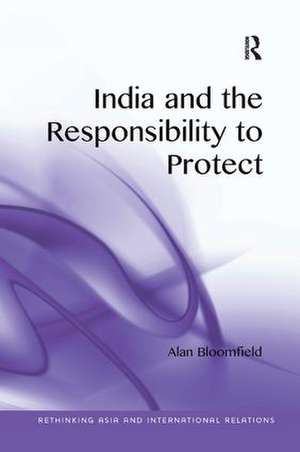India and the Responsibility to Protect: Rethinking Asia and International Relations
Autor Alan Bloomfielden Limba Engleză Paperback – 12 oct 2017
| Toate formatele și edițiile | Preț | Express |
|---|---|---|
| Paperback (1) | 241.15 lei 6-8 săpt. | |
| Taylor & Francis – 12 oct 2017 | 241.15 lei 6-8 săpt. | |
| Hardback (1) | 822.91 lei 6-8 săpt. | |
| Taylor & Francis – 9 dec 2015 | 822.91 lei 6-8 săpt. |
Din seria Rethinking Asia and International Relations
- 17%
 Preț: 258.91 lei
Preț: 258.91 lei -
 Preț: 383.71 lei
Preț: 383.71 lei -
 Preț: 476.86 lei
Preț: 476.86 lei - 17%
 Preț: 213.58 lei
Preț: 213.58 lei -
 Preț: 469.34 lei
Preț: 469.34 lei -
 Preț: 381.72 lei
Preț: 381.72 lei - 26%
 Preț: 819.48 lei
Preț: 819.48 lei - 31%
 Preț: 764.20 lei
Preț: 764.20 lei -
 Preț: 388.64 lei
Preț: 388.64 lei -
 Preț: 402.94 lei
Preț: 402.94 lei - 17%
 Preț: 222.32 lei
Preț: 222.32 lei -
 Preț: 399.29 lei
Preț: 399.29 lei - 26%
 Preț: 764.36 lei
Preț: 764.36 lei - 18%
 Preț: 1058.38 lei
Preț: 1058.38 lei - 18%
 Preț: 1002.99 lei
Preț: 1002.99 lei - 12%
 Preț: 299.52 lei
Preț: 299.52 lei - 16%
 Preț: 241.15 lei
Preț: 241.15 lei -
 Preț: 390.37 lei
Preț: 390.37 lei - 17%
 Preț: 246.93 lei
Preț: 246.93 lei - 13%
 Preț: 297.99 lei
Preț: 297.99 lei - 31%
 Preț: 762.97 lei
Preț: 762.97 lei - 31%
 Preț: 767.38 lei
Preț: 767.38 lei -
 Preț: 463.58 lei
Preț: 463.58 lei - 26%
 Preț: 762.16 lei
Preț: 762.16 lei -
 Preț: 469.34 lei
Preț: 469.34 lei - 31%
 Preț: 765.45 lei
Preț: 765.45 lei - 26%
 Preț: 764.20 lei
Preț: 764.20 lei - 30%
 Preț: 847.86 lei
Preț: 847.86 lei -
 Preț: 383.33 lei
Preț: 383.33 lei - 25%
 Preț: 767.01 lei
Preț: 767.01 lei - 18%
 Preț: 1004.55 lei
Preț: 1004.55 lei - 18%
 Preț: 1109.18 lei
Preț: 1109.18 lei - 26%
 Preț: 679.92 lei
Preț: 679.92 lei
Preț: 241.15 lei
Preț vechi: 288.80 lei
-16% Nou
Puncte Express: 362
Preț estimativ în valută:
46.14€ • 48.31$ • 38.18£
46.14€ • 48.31$ • 38.18£
Carte tipărită la comandă
Livrare economică 05-19 aprilie
Preluare comenzi: 021 569.72.76
Specificații
ISBN-13: 9781138576551
ISBN-10: 1138576557
Pagini: 245
Dimensiuni: 156 x 234 mm
Greutate: 0.45 kg
Ediția:1
Editura: Taylor & Francis
Colecția Routledge
Seria Rethinking Asia and International Relations
Locul publicării:Oxford, United Kingdom
ISBN-10: 1138576557
Pagini: 245
Dimensiuni: 156 x 234 mm
Greutate: 0.45 kg
Ediția:1
Editura: Taylor & Francis
Colecția Routledge
Seria Rethinking Asia and International Relations
Locul publicării:Oxford, United Kingdom
Notă biografică
Alan Bloomfield is a former solicitor from Perth, Australia. After completing degrees in Australia and Canada in the field of international relations he is currently the Vice-Chancellor’s Postdoctoral Fellow in the School of Social Sciences at UNSW Australia.
Recenzii
’As India's influence grows, its views about the norms of international society are increasingly important. This book provides timely insights into India's changing views of the duties beyond borders arising from humanitarian crises and its ambivalent engagement with the concept of the Responsibility to Protect. Based on extensive research, it is essential reading for scholars of India's foreign relations.’ Ian Hall, Griffith University, Australia ’Dr Bloomfield's timely study not only offers new insights into the political fortunes of R2P, it is a welcome response to the growing international recognition of our need to better understand the domestic influences on India's engagement with international norms and institutions.’ Shirley Scott, The University of New South Wales, Australia
Cuprins
Preface, Introduction: India and the Responsibility to Protect, 1 Humanitarian Intervention and the Responsibility to Protect Before 2011, 2 Discourses, Norms and Conceptual Models, 3 India and Humanitarian Intervention, and R2P, Before 2011, 4 India and the Crisis in Côte d’Ivoire, 5 India and the Crisis in Libya, 6 India and the Crisis in Syria, Conclusion: India and the Responsibility to Protect after the Crises in Côte d’Ivoire, Libya and Syria, Bibliography, Index
Descriere
This book examines India’s historical responses to humanitarian crises, starting with the 1971 Bangladesh Liberation War, concentrating on the years 2011 and 2012 when India sat on the UN Security Council. Three serious humanitarian crises broke during its tenure - in Côte d'Ivoire, Libya and Syria - which collectively sparked a ferocious debate within India. Bloomfield examines what became largely a battle over ’what sort of actor’ modern India is, or should be, to determine how this contest shaped both India’s responses to these humanitarian tragedies and also the wider debates about rising India’s international identity.
